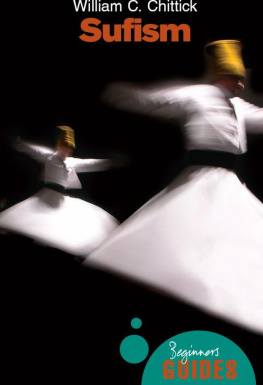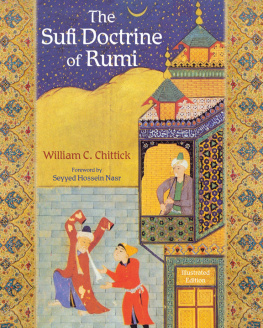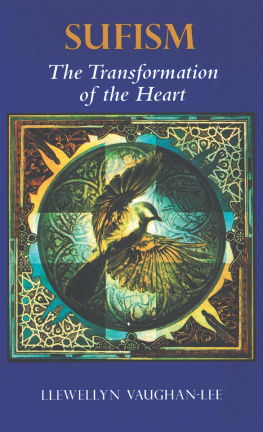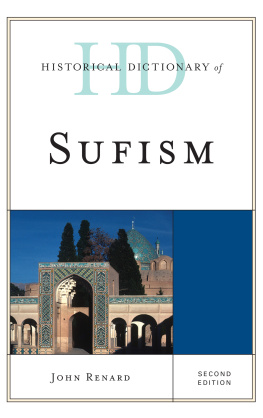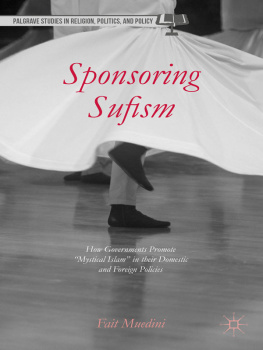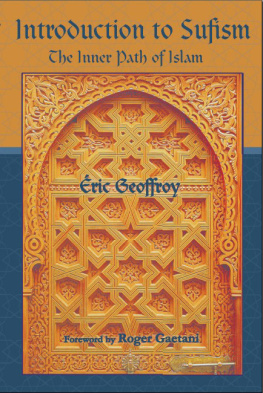William C. Chittick - Sufism
Here you can read online William C. Chittick - Sufism full text of the book (entire story) in english for free. Download pdf and epub, get meaning, cover and reviews about this ebook. year: 2011, publisher: Oneworld Publications, genre: Religion. Description of the work, (preface) as well as reviews are available. Best literature library LitArk.com created for fans of good reading and offers a wide selection of genres:
Romance novel
Science fiction
Adventure
Detective
Science
History
Home and family
Prose
Art
Politics
Computer
Non-fiction
Religion
Business
Children
Humor
Choose a favorite category and find really read worthwhile books. Enjoy immersion in the world of imagination, feel the emotions of the characters or learn something new for yourself, make an fascinating discovery.
- Book:Sufism
- Author:
- Publisher:Oneworld Publications
- Genre:
- Year:2011
- Rating:5 / 5
- Favourites:Add to favourites
- Your mark:
- 100
- 1
- 2
- 3
- 4
- 5
Sufism: summary, description and annotation
We offer to read an annotation, description, summary or preface (depends on what the author of the book "Sufism" wrote himself). If you haven't found the necessary information about the book — write in the comments, we will try to find it.
Sufism — read online for free the complete book (whole text) full work
Below is the text of the book, divided by pages. System saving the place of the last page read, allows you to conveniently read the book "Sufism" online for free, without having to search again every time where you left off. Put a bookmark, and you can go to the page where you finished reading at any time.
Font size:
Interval:
Bookmark:
Sufism
A Beginners Guide
ONEWORLD BEGINNERS GUIDES combine an original, inventive, and engaging approach with expert analysis on subjects ranging from art and history to religion and politics, and everything in between. Innovative and affordable, books in the series are perfect for anyone curious about the way the world works and the big ideas of our time.
african | genetics |
anarchism | changeglobal terrorism |
aquinas | hinduism |
artificial intelligence | history of science |
the bahai faith | humanism |
the beat generation | islamic philosophy |
biodiversity | journalism |
bioterror & biowarfare | judaism |
the brain | lacan |
british politics | life in the universe |
the buddha | literary theory |
cancer | machiavelli |
censorship | mafia & organized crime |
christianity | magic |
civil liberties | marx |
classical music | medieval philosophy |
climate change | middle east |
cloning | NATO |
cold war | nietzsche |
conservation | the northern ireland conflict |
crimes against humanity | oil |
criminal psychology | opera |
critical thinking | the palestineisraeli conflict |
daoism | particle physics |
democracy | paul |
descartes | philosophy of mind |
dyslexia | philosophy of religion |
energy | philosophy of science |
engineering | postmodernism |
the enlightenment | psychology |
epistemology | quantum physics |
evolution | the quran |
evolutionary psychology | racism |
existentialism | renaissance art |
fair trade | shakespeare |
feminism | the small arms trade |
forensic science | sufism |
french revolution | volcanoes |

A Beginners Guide
William C. Chittick

A Oneworld Book
First published by Oneworld Publications as
Sufism: A Short Introduction, 2000
Reprinted 2001, 2003, 2005
First published in the Beginners Guide series, 2008
This ebook edition published by Oneworld Publications 2011
Copyright William C. Chittick 2000
All rights reserved
Copyright under Berne Convention
A CIP record for this title is available
from the British Library
ISBN 9781780740522
Typeset by Jayvee, Trivandrum, India
Cover design by Two Associates
Oneworld Publications
185 Banbury Road
Oxford OX2 7AR
England
Learn more about Oneworld. Join our mailing list to
find out about our latest titles and special offers at:
www.oneworld-publications.com
I first began studying Sufism more than thirty years ago as an undergraduate. At that time, few people had ever heard the name, and I constantly had to explain what it was (or what I thought it was at the time). Nowadays, everyone seems to have heard of Sufism, and the name is mentioned in daily newspapers, bestselling novels, and popular movies. Back then Rumi was hardly known outside university courses on Middle Eastern Studies, but today his poetry is found in any bookstore and recited on television by celebrities. The whirling dervishes were a piece of exotica left over from nineteenth-century travelers accounts, but today people learn Sufi dancing in health clubs and New Age centers. All this new-found fame might lead us to conclude that Sufism is much better known than it was thirty years ago, but this is not really the case, though a once strange name has indeed become a bit more familiar.
The great surge in books on Sufism over the past few years has made a large amount of information available, but in certain ways it has added to the confusion. The academic books are too specialized and technical to be useful for beginners, and the much greater number of books written by enthusiasts or Sufi teachers present radically different views about Sufisms reality. The scholars impose their own conceptual schemes from the outside, and the enthusiasts look at the tradition from the privileged standpoint of insiders, but limited to specific contemporary branches of Sufism. In this book I have tried to find a middle way between academic obscurity and enthusiast advocacy.
I have provided a relatively large amount of translation from primary texts, because any attempt to understand Sufism in its own context demands looking at its own ways of expressing itself, not simply at interpretations made in contemporary terms.
My goal throughout is to let the tradition speak for itself. Although this task is almost impossible, the attempt may help set this book apart from other introductory works available in English. I take as my mentor here Abd ar-Rahman Jami (d. 1492), who writes as follows in the introduction to his well-known Sufi classic Lawaih:
It is hoped that none will see in the midst the one who has embarked on this explication, or sit on the carpet of avoidance and the mat of protest, since the author has no share save the post of translator, and no portion save the trade of speaker.
This book is based on primary sources written in Arabic and Persian. Arabic is a Semitic language, a sister of Hebrew and Aramaic, and the most important language of Islamic civilization. Literary Arabic was fixed in its current form by the appearance of the Koran in the seventh century. The language has a vast Sufi literature, much of it written by authors whose mother tongue was Persian, Turkish, or one of the many other languages spoken by Muslims. As for Persian, it is an Indo-European language like English and Sanskrit. It became established in its present form in the ninth and tenth centuries, largely under the influence of Islamic learning, so it has a heavy overlay of Arabic vocabulary. It rivaled Arabic as the most important language of Islamic civilization wherever it spread, from Turkey to China, but especially in the Indian subcontinent. Sufi authors play a more central role in Persian than they do in Arabic, if only because many of the greatest Persian poets were steeped in Sufi learning. It is sufficient to mention Sanai, Nizami, Attar, Rumi, Sadi, and Hafiz arguably the six greatest poets in one of the worlds greatest poetical traditions.
I will be citing the Koran, the Hadith (the corpus of sayings attributed to Muhammad), and many Sufi teachers, from earliest times down to Jami in the fifteenth century. I have not forgotten that the Sufi tradition has continued to flourish into modern times and that other Islamic languages also have much to offer. But limits have to be drawn somewhere, and the Sufis whom I will be quoting represent the classical formulation of teachings that have permanently colored the tradition.
Next pageFont size:
Interval:
Bookmark:
Similar books «Sufism»
Look at similar books to Sufism. We have selected literature similar in name and meaning in the hope of providing readers with more options to find new, interesting, not yet read works.
Discussion, reviews of the book Sufism and just readers' own opinions. Leave your comments, write what you think about the work, its meaning or the main characters. Specify what exactly you liked and what you didn't like, and why you think so.

